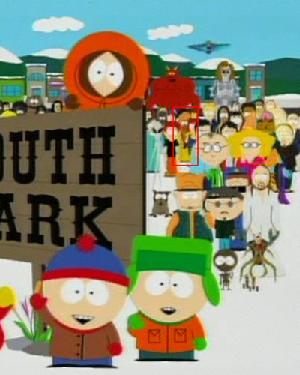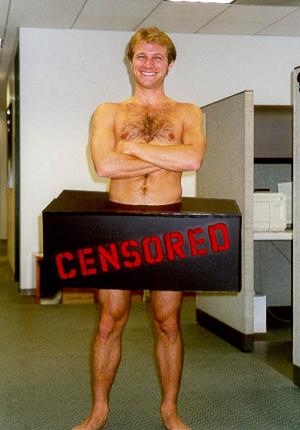Fear and Free Expression
 | | Not an Evanescence album cover |
Several years ago, a friend of mine accused me of not caring about the lives of men and women who go to war. The discussion resulted from an essay I wrote concerning the proposed invasion of Iraq (probably this one, which is only slightly embarrasing in hindsight), in which I postulated that an invasion was not only necessary, but inevitable. My friend contended that, because I wasn't in the military and didn't have any friends or family in the military, I didn't have the authority to speak on the issue. (I do have a few friends who went to Iraq and I come from a military family, but I digress.) I took this personally, because I firmly believe that words have consequences and that we can't let fear silence us.
I'm not proud enough to believe that I have much influence over people, but suppose one person out there found my blog, read my arguments about Iraq, was convinced by my words to sign up to go to war, and then was promptly blown up by a roadside bomb. As I see it, I might be a teeny-weeny bit responsible for that person's death, despite what I might tell you about personal choice and personal responsibility. Therefore, while I might not be on the front lines, I do not speak as though my words have no consequences. On the other hand, I also believe that you can't let your fear of that responsibility keep you from speaking out on issues that matter to you.
This essay isn't about the First Amendment definition of free speech, because as far as I can tell, Congress hasn't passed any laws lately that have infringed on my freedom of expression. This essay is about the responsibilities that come from having that freedom, about whether we should draw a line for ourselves and say that there are some issues we simply shouldn't discuss or some things we simply shouldn't say. This essay is about political assembly and the right to protest, and why nobody should be bullied into silence because somebody else is scared of what might happen.
 | | Also, Muhammed has been in the opening of the show for the last nine years |
Two weeks ago, Comedy Central's South Park aired their two-hundredth episode. It wasn't a particularly funny episode, but it made headlines for daring to discuss and portray (sort-of) the Prophet Muhammed. In most interpretations of the Islamic faith, it is considered a sin to show any kind of representation of the Prophet Muhammed--or any prophet for that matter--which has in recent years been the justification for violent protests like the ones against 12 cartoonists who dared to draw Muhammed and the Danish newspaper that dared to publish the drawings. At the end of the Danish cartoon scandal, over a hundred people had been killed by Islamic protesters. This "don't portray the prophets" rule is also partly why Salman Rushdie still has a price on his head and why Dutch artist Theo Van Gogh (distant relative of Vincent Van Gogh) was brutally murdered in 2004.
South Park is notable for its extreme social satire and this definitely wasn't the first time the show has tackled the issue of religious intolerance. It wasn't even the first time they portrayed the Prophet Muhammed. Back before 9/11, as the show itself points out, there was an episode that had Muhammed completely uncensored along with several other religious figures. At the time, nobody cared. Two weeks ago, however, daring to even threaten to portray Muhammed (Muhammed is never actually seen in the episode, though one character draws a stick figure and asks if that is offensive or not) garnered the creators of South Park a passive-agressive death threat from a U.S. citizen who explained in a web posting that the same thing that happened to Theo Van Gogh would happen to Trey Parker and Matt Stone. He also provided information on where Parker and Stone lived.
The next episode of the show was a continuation of the previous one, and the executives at Comedy Central decided (wisely or not) to bleep out every mention of Muhammed, making the episode borderline incomprehensible. The Prophet Muhammed himself appeared behind a black "CENSORED" square, and oddly, a 35-second closing speech about intolerance was also bleeped out. Ignoring the obvious irony of an episode about censorship being heavily censored, one obvious truth we should take away from this whole escapade is, to put it simply, the terrorist won.
 | | Some self-censorship is welcomed |
But threats to free expression aren't coming solely from Islamic extremists. Back during the build-up to the Iraq war, while I was busy writing about how the war was inevitable, there were a few extreme politicians and commentators arguing that protesting the war was putting the security of the troops in danger. Protestors quickly defended themselves, throwing around the words of Thomas Jefferson about dissent being patriotic, and after a few years, the controversy petered out. Whenever the government is being protested, people in power want to quell the protests and they often use fear and intimidation to do it, albeit in subtle ways.
This is happening today, in case you hadn't noticed. The "Tea Party" movement is, like the Iraq war protests a few years back, a populist movement based on criticism of the government. While the Iraq war protestors had to deal with politicians and pundits questioning their patriotism, the Tea Party movement has had to deal with far worse. Politicians, pundits, journalists, comedians, and bloggers have all been spouting nonsense about the Tea Party being racist or bigotted (or Nazis, as the New York Times helpfully explains). Lately, this has gone to a whole new level, with former President Clinton implying that supporting the Tea Party is the same as supporting terrorism. Conservative blowhards Rush Limbaugh, Glenn Beck, and Sarah Palin have also been labeled seditious for questioning their government.
Let's tackle these points one at a time, starting with the charge that the Tea Party is racist. The implication is that, since people weren't protesting President Bush's out of control deficit (despite the fact that there were a shitload of people protesting President Bush's spending), they could only be protesting now because they have a problem with the color of the new president's skin. Bush was white, Obama is black, and that's all that matters, right?
-e. magill 4/27/2010
|
|